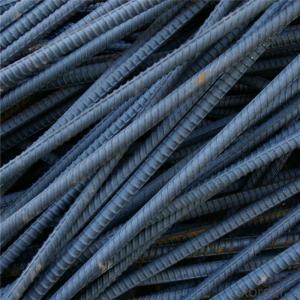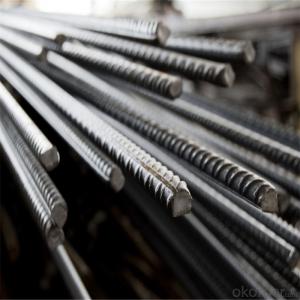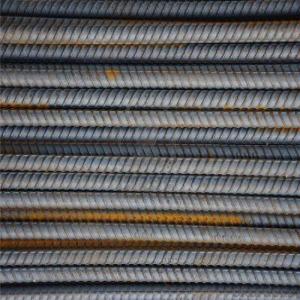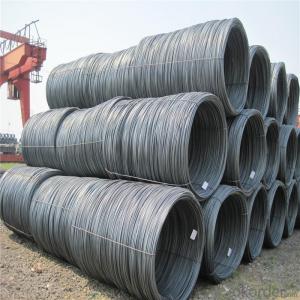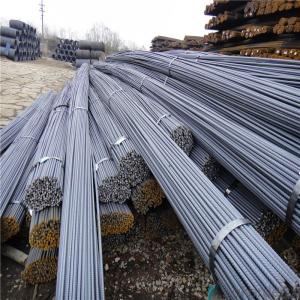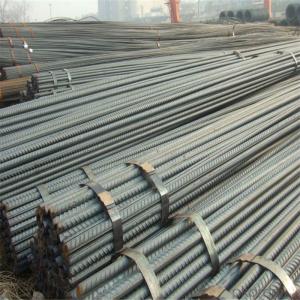Astm 615 Gr40 Gr60 Deformed Steel Rebars
- Loading Port:
- Tianjin
- Payment Terms:
- TT OR LC
- Min Order Qty:
- 200 m.t.
- Supply Capability:
- 500000 m.t./month
OKorder Service Pledge
OKorder Financial Service
You Might Also Like
Item specifice
Astm 615 Gr40 Gr60 Deformed Steel Rebars
Description of Astm 615 Deformed Steel Rebars
1, Diameter: 5.5mm-10mm Astm 615 Deformed Steel Rebars
10m- 40mm Astm 615 Deformed Steel Rebars
2, Length: 6m, 9m, 12m or customized
3, Standard: GB, ASTM, AISI, SAE, DIN, JIS, EN
OEM technology - send detailed technical parameters for accurate quotation.
2, Produce Process: smelt iron - EAF smelt billet - ESR smelt billet -
hot rolled or forged to get the steel round bar and plate
3, Heat Treatment: annealing, normalizing, tempering, quenching
4, Surface Treatment: Black
5, Quality Assurance: We accept third party inspection for all orders.
You can ask testing organizations such as SGS, BV, etc. to test our products before shipping.
Chemical Composition of Astm 615 Deformed Steel Rebars
Grade | Technical data of the original chemical composition(%) | |||||
Reinforcing steel bar HRB335 | C | Mn | Si | S | P | B |
≤0.25 | ≤1.60 | ≤0.80 | ≤0.045 | ≤0.045 | >0.0008 | |
Physics Capability | ||||||
Yield Strength(N/cm2) | Tensile Strength(N/cm2) | Elongation(%) | ||||
≥ 335 | ≥490 | ≥16 | ||||
Reinforcing steel bar HRB400 | C | Mn | Si | S | P | B |
≤0.25 | ≤0.16 | ≤0.80 | ≤0.045 | ≤0.045 | 0.04-0.12 | |
Physics Capability | ||||||
Yield Strength(N/cm2) | Tensile Strength(N/cm2) | Elongation(%) | ||||
≥ 400 | ≥ 570 | ≥ 14 | ||||
Products Show of Astm 615 Deformed Steel Rebars
Company Information
CNBM International Corporation is the most important trading platform of CNBM group.
Whith its advantages, CNBM International are mainly concentrate on Cement, Glass, Iron and Steel, Ceramics industries and devotes herself for supplying high qulity series of refractories as well as technical consultancies and logistics solutions.


F A Q
1, Your advantages?
professional products inquiry, products knowledge train (for agents), smooth goods delivery, excellent customer solution proposale
2, Test & Certificate?
SGS test is available, customer inspection before shipping is welcome, third party inspection is no problem
3, Factory or Trading Company?
CNBM is a trading company but we have so many protocol factories and CNBM works as a trading department of these factories. Also CNBM is the holding company of many factories.
4, Payment Terms?
30% TT as deposit and 70% before delivery.
Irrevocable L/C at sight.
5, Trading Terms?
EXW, FOB, CIF, FFR, CNF
6, After-sale Service?
CNBM provides the services and support you need for every step of our cooperation. We're the business partner you can trust.
For any problem, please kindly contact us at any your convenient time.
We'll reply you in our first priority within 24 hours.
- Q:How is the toughness of special steel measured?
- The toughness of special steel is typically measured using specific tests and methodologies that evaluate its ability to absorb energy and resist fracture. One common method is the Charpy V-Notch (CVN) test, which involves striking a notched specimen with a pendulum hammer and measuring the energy absorbed during fracture. The results are expressed as the amount of energy absorbed per unit area, usually in joules per square centimeter (J/cm²) or foot-pounds per square inch (ft-lb/in²). Another test commonly used is the Izod test, which is similar to the CVN test but uses a different specimen geometry. Additionally, other mechanical tests like tensile strength, impact strength, and fracture toughness measurements can also be used to assess the toughness of special steel. These tests help engineers and manufacturers determine the suitability of special steel for various applications, especially those that require high resistance to impact or sudden loading.
- Q:Can special steel be used in high-pressure applications?
- Indeed, high-pressure applications can utilize special steel. These steels, also referred to as alloy steels, are intentionally designed to possess improved mechanical properties, including high strength, ductility, and resistance to corrosion. These characteristics make them suitable for enduring high-pressure settings. Industries such as oil and gas, aerospace, automotive, and power generation often employ special steels due to their high-pressure applications. In the oil and gas sector, for instance, special steels are utilized in the production of high-pressure pipelines, valves, and pressure vessels that can withstand the intense pressure conditions during processes like oil drilling, transportation, and refining. The exceptional strength of special steel enables it to withstand the internal pressure exerted by fluids or gases without any deformation or failure. Additionally, its corrosion resistance ensures that the steel remains intact and undamaged even in the demanding operating conditions frequently encountered in high-pressure applications. Furthermore, special steels can be customized to meet specific requirements by adjusting their chemical composition and heat treatment processes. This customization allows the steel to exhibit even greater strength, toughness, and fatigue resistance, thereby making it an ideal choice for applications in high-pressure environments. To summarize, special steel can be utilized in high-pressure applications owing to its enhanced mechanical properties and resistance to corrosion. Its ability to endure extreme pressures makes it a dependable option for numerous industries that encounter high-pressure conditions.
- Q:What are the properties of ultra-high-strength steel?
- Ultra-high-strength steel possesses exceptional mechanical properties, including high tensile strength, excellent toughness, and superior fatigue resistance. It exhibits high stiffness, enabling it to withstand heavy loads and maintain its shape even under extreme conditions. With its low weight and high strength-to-weight ratio, this steel offers enhanced fuel efficiency and increased payload capacity. Additionally, it exhibits good weldability, corrosion resistance, and is often used in applications where both strength and durability are paramount, such as in automotive, aerospace, and construction industries.
- Q:Can special steel be used in the power generation industry?
- Yes, special steel can be used in the power generation industry. Special steel alloys are commonly used in various power generation components such as turbines, boilers, and generators due to their high strength, corrosion resistance, and heat resistance properties. These alloys are designed to withstand extreme temperatures and pressures, ensuring the reliable and efficient operation of power generation equipment.
- Q:What are the different methods of coating special steel?
- There are several different methods of coating special steel, including galvanizing, electroplating, powder coating, and thermal spraying. Galvanizing involves dipping the steel in a bath of molten zinc to create a protective layer. Electroplating uses an electric current to deposit a thin layer of metal onto the steel surface. Powder coating involves applying a dry powder to the steel and then curing it with heat to form a durable coating. Thermal spraying uses a high-velocity stream of molten or semi-molten material to create a protective layer on the steel.
- Q:How does special steel perform in low-temperature applications?
- Special steel performs well in low-temperature applications due to its unique properties such as high strength, toughness, and resistance to brittleness. It retains its mechanical properties even at extremely cold temperatures, making it ideal for industries like aerospace, automotive, and energy where materials need to withstand challenging environments.
- Q:What are the different techniques used for joining special steel?
- Some of the different techniques used for joining special steel include welding, brazing, soldering, and mechanical fastening. Welding involves melting the surfaces of the steel pieces to be joined and fusing them together. Brazing and soldering involve using a filler material that melts at a lower temperature than the steel to join the pieces together. Mechanical fastening techniques, such as bolts, screws, or rivets, can also be used to join special steel components together.
- Q:What are the properties of high-temperature tool steel?
- High-temperature tool steel possesses a combination of properties that make it suitable for use in high-temperature applications. It has excellent hardness, toughness, and wear resistance, enabling it to withstand extreme temperatures without losing its shape or strength. Additionally, it exhibits good thermal conductivity and dimensional stability, ensuring that it maintains its form and performance even under high heat and thermal cycling.
- Q:How does special steel contribute to the agriculture aftermarket industry?
- Special steel contributes to the agriculture aftermarket industry by offering enhanced durability, strength, and corrosion resistance, which are crucial for manufacturing agricultural machinery and equipment. It allows for the production of high-quality components that can withstand harsh farming conditions and heavy usage. Additionally, special steel enables the creation of innovative designs and improved performance, ultimately increasing productivity and efficiency in the agriculture sector.
- Q:Can special steel be used in the production of hydraulic components?
- Yes, special steel can be used in the production of hydraulic components. Special steel possesses superior strength, corrosion resistance, and durability properties, making it suitable for applications in the hydraulic industry. Special steel can withstand high pressure, extreme temperatures, and abrasive environments, ensuring reliable and efficient operation of hydraulic systems.
1. Manufacturer Overview |
|
|---|---|
| Location | |
| Year Established | |
| Annual Output Value | |
| Main Markets | |
| Company Certifications | |
2. Manufacturer Certificates |
|
|---|---|
| a) Certification Name | |
| Range | |
| Reference | |
| Validity Period | |
3. Manufacturer Capability |
|
|---|---|
| a)Trade Capacity | |
| Nearest Port | |
| Export Percentage | |
| No.of Employees in Trade Department | |
| Language Spoken: | |
| b)Factory Information | |
| Factory Size: | |
| No. of Production Lines | |
| Contract Manufacturing | |
| Product Price Range | |
Send your message to us
Astm 615 Gr40 Gr60 Deformed Steel Rebars
- Loading Port:
- Tianjin
- Payment Terms:
- TT OR LC
- Min Order Qty:
- 200 m.t.
- Supply Capability:
- 500000 m.t./month
OKorder Service Pledge
OKorder Financial Service
Similar products
New products
Hot products
Related keywords
